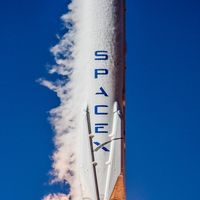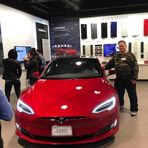The Tug of War: Trump, Musk, and the Future of American Governance
January 25, 2025, 3:38 am

Location: United States, District of Columbia, Washington
Employees: 5001-10000
Founded date: 2002
Total raised: $7.53B

Location: United States, Texas, Austin
Employees: 10001+
Founded date: 2003
Total raised: $3.86B
In the arena of American politics, the stage is set for a dramatic showdown. Donald Trump, back in the presidential seat, is wielding promises like a sword. He aims to slice through the bureaucratic red tape that many Americans see as a choking vine around the federal government. The air is thick with discontent. Two-thirds of U.S. adults believe corruption and inefficiency are major issues. Even among Democrats, the sentiment is palpable. The government feels like a ship adrift, and the crew is losing faith.
Trump's vision is clear: cut regulations and trim the federal workforce. He wants to usher in a new era of efficiency. Yet, the public's response is mixed. While a significant portion supports a return to the office for federal workers, many recoil at the idea of mass firings. It’s a delicate dance, balancing the need for efficiency with the fear of job loss.
Elon Musk, the billionaire provocateur, is a key player in this unfolding drama. His relationship with Trump is a double-edged sword. While Musk’s star power can draw attention, it also raises eyebrows. About one-third of Americans view him favorably, but that number is slipping. The overlap in perceptions of Musk and Trump is striking. Half of the populace holds an unfavorable view of both.
Musk’s influence is a double-edged sword. Many Americans are wary of billionaires shaping government policy. A recent poll reveals that 60% of adults see this as a negative trend. They fear that the interests of the wealthy may overshadow the needs of the average citizen. This skepticism looms large as Musk and Trump embark on ambitious projects like the $500 billion Stargate initiative.
The Stargate Project, a brainchild of Trump and Musk, aims to position the U.S. as a leader in artificial intelligence. It promises jobs and economic growth. Yet, doubts linger. Musk has questioned the funding, suggesting that the money may not be as secure as claimed. His comments have ignited a firestorm of debate. Microsoft CEO Satya Nadella, meanwhile, stands firm, touting his own $80 billion investment in AI. The stakes are high, and the tension is palpable.
The return-to-office mandate for federal workers is a cornerstone of Trump’s strategy. About 40% of Americans support this move, viewing it as a necessary step toward efficiency. However, the prospect of cutting federal jobs is less popular. Only 30% back this idea, while 40% oppose it. This divide reflects a broader unease about the future of work in America.
Trump’s narrative is one of dismantling the so-called “deep state.” He claims that career bureaucrats are obstructing his agenda. Yet, only a third of Americans see this as a significant issue. The perception of a shadowy network pulling the strings is fading. Instead, the focus is shifting to tangible problems: corruption, inefficiency, and the burden of regulations.
As Trump pushes forward, he faces a public that is cautiously optimistic but deeply skeptical. The call for a return to the office resonates, but the fear of job cuts lingers like a dark cloud. The balance between reform and stability is precarious.
Musk’s role complicates matters further. His reputation as a disruptor can be both a blessing and a curse. While some admire his boldness, others question his motives. The feud between Musk and Altman over the Stargate Project underscores this tension. Musk’s claims about funding have raised eyebrows, and Altman’s rebuttals highlight the friction between innovation and accountability.
The Stargate Project promises to be a game-changer. It aims to harness AI for the greater good, but skepticism remains. The public is wary of grand promises that may not materialize. The narrative of American leadership in technology is enticing, but the execution is fraught with challenges.
As Trump and Musk navigate this complex landscape, they must contend with a public that is both hopeful and wary. The path forward is unclear. Will they succeed in reshaping the federal government, or will they stumble under the weight of their ambitions?
In this high-stakes game, the players are bold, but the audience is discerning. Americans are watching closely, weighing the promises against the realities. The tug of war between efficiency and job security, innovation and accountability, is just beginning.
The future of American governance hangs in the balance. The stakes are high, and the outcome is uncertain. Will Trump and Musk emerge as champions of change, or will they become symbols of a system that continues to falter? Only time will tell. The stage is set, and the drama is unfolding.
Trump's vision is clear: cut regulations and trim the federal workforce. He wants to usher in a new era of efficiency. Yet, the public's response is mixed. While a significant portion supports a return to the office for federal workers, many recoil at the idea of mass firings. It’s a delicate dance, balancing the need for efficiency with the fear of job loss.
Elon Musk, the billionaire provocateur, is a key player in this unfolding drama. His relationship with Trump is a double-edged sword. While Musk’s star power can draw attention, it also raises eyebrows. About one-third of Americans view him favorably, but that number is slipping. The overlap in perceptions of Musk and Trump is striking. Half of the populace holds an unfavorable view of both.
Musk’s influence is a double-edged sword. Many Americans are wary of billionaires shaping government policy. A recent poll reveals that 60% of adults see this as a negative trend. They fear that the interests of the wealthy may overshadow the needs of the average citizen. This skepticism looms large as Musk and Trump embark on ambitious projects like the $500 billion Stargate initiative.
The Stargate Project, a brainchild of Trump and Musk, aims to position the U.S. as a leader in artificial intelligence. It promises jobs and economic growth. Yet, doubts linger. Musk has questioned the funding, suggesting that the money may not be as secure as claimed. His comments have ignited a firestorm of debate. Microsoft CEO Satya Nadella, meanwhile, stands firm, touting his own $80 billion investment in AI. The stakes are high, and the tension is palpable.
The return-to-office mandate for federal workers is a cornerstone of Trump’s strategy. About 40% of Americans support this move, viewing it as a necessary step toward efficiency. However, the prospect of cutting federal jobs is less popular. Only 30% back this idea, while 40% oppose it. This divide reflects a broader unease about the future of work in America.
Trump’s narrative is one of dismantling the so-called “deep state.” He claims that career bureaucrats are obstructing his agenda. Yet, only a third of Americans see this as a significant issue. The perception of a shadowy network pulling the strings is fading. Instead, the focus is shifting to tangible problems: corruption, inefficiency, and the burden of regulations.
As Trump pushes forward, he faces a public that is cautiously optimistic but deeply skeptical. The call for a return to the office resonates, but the fear of job cuts lingers like a dark cloud. The balance between reform and stability is precarious.
Musk’s role complicates matters further. His reputation as a disruptor can be both a blessing and a curse. While some admire his boldness, others question his motives. The feud between Musk and Altman over the Stargate Project underscores this tension. Musk’s claims about funding have raised eyebrows, and Altman’s rebuttals highlight the friction between innovation and accountability.
The Stargate Project promises to be a game-changer. It aims to harness AI for the greater good, but skepticism remains. The public is wary of grand promises that may not materialize. The narrative of American leadership in technology is enticing, but the execution is fraught with challenges.
As Trump and Musk navigate this complex landscape, they must contend with a public that is both hopeful and wary. The path forward is unclear. Will they succeed in reshaping the federal government, or will they stumble under the weight of their ambitions?
In this high-stakes game, the players are bold, but the audience is discerning. Americans are watching closely, weighing the promises against the realities. The tug of war between efficiency and job security, innovation and accountability, is just beginning.
The future of American governance hangs in the balance. The stakes are high, and the outcome is uncertain. Will Trump and Musk emerge as champions of change, or will they become symbols of a system that continues to falter? Only time will tell. The stage is set, and the drama is unfolding.